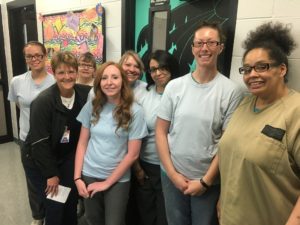According to a 2016 Atlantic article, the female prison population has grown 50% faster than the male population since 1980, and many women inmates (if not most) experienced mental health issues, substance abuse problems, inadequate access to health care and/or were physically or sexually abused prior to coming into prison. Many times, women’s victimization and the trauma they experience leads to other “medicating” behaviors that drive many of them into the criminal justice system, where they are re-victimized.
 In a recent visit I took to the Pocatello Women’s Correctional Center (PWCC) these statistic rang true. Most of the women I met were dealing with addictions, mental health challenges, and the aftermath of trauma.
In a recent visit I took to the Pocatello Women’s Correctional Center (PWCC) these statistic rang true. Most of the women I met were dealing with addictions, mental health challenges, and the aftermath of trauma.
Unfortunately, due to inadequate health care funding at the state level, the prison system is one of the main places where women receive mental health and addiction treatment in Idaho. It would be much cheaper and more humane to give our citizens the treatment they need, rather than ignoring them and letting the much more costly prison system take them on.
I was deeply troubled as I listened to their stories and wondered what we could do to address a growing prison population and put resources where they need to be to help people instead of imprisoning them. First and foremost, we need to improve our education system and enact full day kindergarten and early learning programs; there are direct correlations to literacy and early learning to reduce incarceration. We need to provide access to health care, including mental health care; access to preventative and catastrophic care should be a human right not one that only the wealthy can afford. The state should also invest in more substance abuse treatment programs and support innovative approaches to keep people sober; we should also address issues like the opioid crisis at the root cause and work with doctors and pharmaceutical companies to better regulate prescriptions to highly addictive medication to cut off the prescription to street drug addictions.
We must create systems where everyone – rural/urban, man/woman – has a chance to succeed at an early age; many of the women I met wouldn’t be here in the first place had they not first been victimized and/or had treatment options or resources in the larger community.
The system we have leaves police hung out to dry since they don’t have many alternatives other than arresting women and sending them to prison. If the state invested in adequate mental health and drug treatment programs and if police, prosecutors and judges had more tools at their disposal, we could divert many of these women to drug treatment programs or provide them with access to mental health treatment instead of locking them up and tearing them from their families for non-violent crimes. The incarceration of one woman can have a harmful ripple effect on their families, especially children, which in turn makes our communities weaker.
Some female inmates get caught up in Idaho’s mandatory minimum drug sentencing scheme. Drug crimes are among just a handful of crimes in which Idaho judges don’t have discretion in sentencing. They have discretion when it comes to crimes like arson or manslaughter, but not drugs. During my visit to PCWW on May 15, 2017, I met with thirteen women sentenced under this law. Only one had actually sold drugs and that was to support her addiction. Through their tears, these women recounted stories of victimization and how they used drugs to “mask” and “try to forget” the pain and trauma they were suffering. Some had sought out drug treatment programs but couldn’t find help. I don’t know all their histories, but I couldn’t help think that most of these women shouldn’t be in prison to deal with an addiction problem that most likely started due to some sort of victimization they experienced.
This past session, bipartisan legislation was introduced by Rep Ilana Rubel and Rep Christy Perry to restore power to our judges to make those decisions. We elect these judges to do a job, so let them do it. There is growing support throughout the nation to end mandatory minimums for certain drug crimes – especially the non-violent ones. This is one of the very few issues in the country where Republicans, Conservatives and Democrats are coming together to effect change in the system.
These inmates broke the law and they are paying their debt to society. But when they have served their time, we have a collective interest as a state to see they don’t come back. I was saddened to think how many women can’t get mental health treatment unless they go to prison. But while they’re here, it’s to everyone’s advantage to provide them with mental health, education and job training opportunities.
And that’s just what Warden Gentry and her staff at PWCC are doing. Since her appointment two years ago, the prison has gone through changes from simple and affordable improvements in paint and furniture to educational and therapeutic programs that are evidence based and successful. By incorporating strategies to “normalize” life, the prison experience is less dehumanizing and enhances opportunities for inmates to learn from their mistakes and practice skills that will lend to their success when they reenter their communities.
I was struck by feelings of hope and discussions of skills they were practicing or lessons learned, a stark difference from my visit two years ago.
The most striking change is the focus on “trauma informed care” and recognizing the role that gender socialization plays when constructing programming to meet the needs of women in prison. Most women in prison have been victims of violence, themselves. According to a 2005 study Pathways to Prison: Impact of Victimization in the Lives of Incarcerated Women, the impacts of violence are long lasting from physical injury to damage to self-worth to introduction to addictive behaviors, such as drug and alcohol abuse, to long-term negative impacts on relationships and trust. All this has to be taken into account when working with women who are incarcerated, who have been victims first.
“The way that a society treats its prisoners is one of the sharpest reflections of its character.”
These wise words were spoken by President Nelson Mandela at the official launch of the Retraining and Human Rights Project of the Department of Correctional Services. Spoken halfway around the world, these words ring true for any system of incarceration, and we owe it to ourselves individually and as US citizens to be mindful of the rights of all people, especially those locked away out of the public eye.
